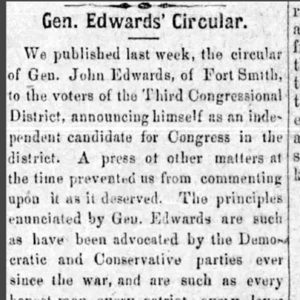calsfoundation@cals.org
John Edwards (1815–1894)
John Edwards was a Republican member of the U.S. House of Representatives. Initially declared the victor in the election of 1870, he represented the Third District of Arkansas for most of the Forty-Second Congress, serving from 1871 until 1872.
John Edwards was born on October 24, 1815, in Louisville, Kentucky, to John Edwards and Nancy Geiger Edwards. He received his early education in the Louisville schools, but he eventually moved to Indiana, reportedly in order to leave a slave state. He studied the law and was admitted to the state bar. In 1848, he was elected to the Indiana House of Representatives, where he served one term. Edwards moved to California and was soon elected an alcalde, a type of municipal magistrate. Edwards returned to Indiana in 1852 and was elected to the Indiana Senate by the Whig Party. Edwards had inherited slaves from his father’s estate, but he freed them and also provided them with property in Indiana on which they could live.
In 1853, Edwards moved again, this time to Chariton, Iowa, where he established a legal practice. In 1856, he was selected to serve in the Iowa Constitutional Convention, which was creating a new constitution for the state; the new constitution was adopted in 1857. Joining the newly created Republican Party, Edwards was elected to the Iowa House of Representatives, serving from 1856 to 1860, eventually becoming Speaker of the House.
With the onset of the Civil War, Edwards joined the Union army, earning a commission as aide-de-camp to Iowa governor Samuel J. Kirkwood. He received the rank of lieutenant colonel of cavalry. Edwards was soon promoted to colonel and given command of the Eighteenth Iowa Infantry. He saw action in a number of engagements in Missouri and northern Arkansas and was ultimately promoted to brigadier general. As the war ended, Edwards was stationed at Fort Smith (Sebastian County), where he stayed. He was appointed United States Assessor of Internal Revenue by President Andrew Johnson and held that post from August 1866 to May 1869.
Arkansas’s Republican Party was deeply divided by the competing intra-party loyalties that characterized post-war Reconstruction politics, and the 1870 election for the Third District seat offered a stark example of the conflict. Supported by the Liberal wing of the party, a group that coalesced in opposition to President Ulysses S. Grant’s bid for reelection in 1872, Edwards challenged incumbent Thomas Boles for the House seat. Although Boles appeared to have won by about 3,000 votes, Edwards was declared the winner in an apparent power play by Governor Powell Clayton. Presenting the certificate of election he had been granted by the governor, he assumed his seat at the start of the Forty-Second Congress. However, Boles refused to accept the initial result and, claiming fraud, pursued a challenge. His allegations were supported by the House Committee on Elections, and he reclaimed his seat, being sworn in on February 9, 1872. Edwards accepted the verdict and retired to private life, remaining in Washington DC, where he resumed the practice of law.
Edwards married Eliza Jane Knight in Lawrence, Indiana, in 1834. They had seven children before Eliza died. In 1854, Edwards married Catherine Whisenand in Chariton, Iowa. They had three children before Catherine’s death. In 1880, Mary Burland Bevans married Edwards in Washington DC; they had two daughters.
At the time of Edwards’s death on April 8, 1894, he was practicing law in Washington DC. He is interred in Arlington National Cemetery in Washington DC.
For additional information:
“Contested Seats in Congress.” Evening Post (New York, New York), January 19, 1872, p. 2.
“John Edwards.” Biographical Directory of the United States Congress. http://bioguide.congress.gov/scripts/biodisplay.pl?index=E000072 (accessed September 29, 2021).
“Representative John Edwards.” Iowa Legislature. https://www.legis.iowa.gov/legislators/legislator?ga=7&personID=5559 (accessed September 29, 2021).
“Troubles in Arkansas.” Patriot (Harrisburg, Pennsylvania), December 5, 1872, p. 1.
William H. Pruden III
Ravenscroft School
 Civil War through Reconstruction, 1861 through 1874
Civil War through Reconstruction, 1861 through 1874 Politics and Government
Politics and Government Second Arkansas Infantry (US)
Second Arkansas Infantry (US) John Edwards Endorsement
John Edwards Endorsement 




Comments
No comments on this entry yet.